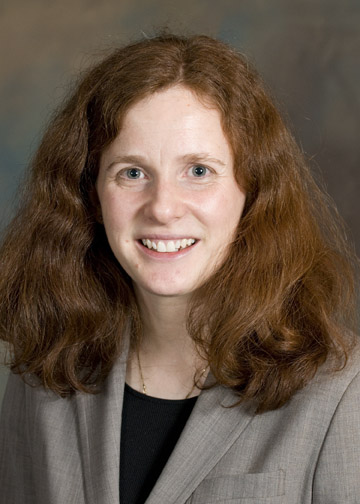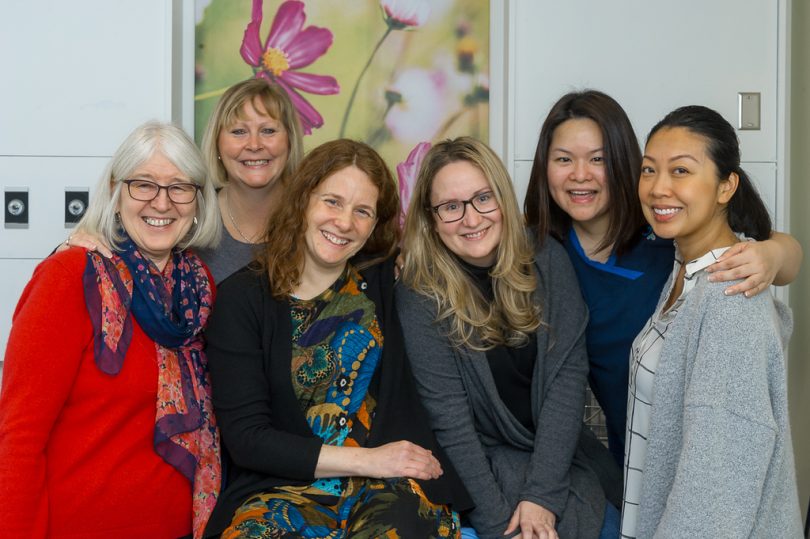A multidisciplinary breast health clinic at Mount Saint Joseph Hospital has shaped the way breast health problems are diagnosed, treated and managed in British Columbia.
The Providence Breast Centre has developed innovative, less-invasive ways to treat patients, and conducted health systems research to demonstrate how their methods have improved patient outcomes. They were the first in BC to use a new procedure utilizing a magnetic seed to mark and remove tumours.
A unified program to consolidate breast cancer care
The centre helps patients with a variety of breast health concerns, including cancer. As the centre’s medical director, Dr. Rebecca Warburton monitors the program, ensures that patients get to the right doctors within wait time targets, and guides the centre’s vision of how the group will move forward. They are currently undergoing a redevelopment project to determine how best to serve their patient population and grow the program into a research centre of excellence.
Surgery is the first step in the treatment journey for many people with breast cancer. The Providence Breast Centre coordinates various aspects of a patient’s surgical care, which often requires several different specialists. Their team consists of seven breast surgical oncologists, five nurses, six clerical support members, three plastic surgeons, and three breast pathologists. They work closely with family physicians and breast radiologists who work adjacent to the centre.
The centre was established in 2009 to address a gap in care – namely, that breast cancer care was becoming too complicated and fragmented in the Lower Mainland. The centre aims to be able to provide all necessary services to their patients in one location, and works closely with a team of nurse navigators that is dedicated to helping patients through the complex web of healthcare issues related to their diagnosis and treatment.
“We were trying to pull things together in a more unified program, similar to what was being done and what was becoming standard elsewhere in the world,” says Dr. Elaine McKevitt, one of the centre’s surgical oncologists. The development of the centre, particularly its research capabilities, was supported by Dr. Carl Brown, a leading colorectal surgeon and the winner of the 2023 Research and Mission Award.

Understanding patient outcomes with health systems research
Research has been integral to what the Providence Breast Centre does since its beginning. The ability to understand patients and their outcomes is an important part of running the centre. When the team develops an innovative way to deliver care, they conduct health systems research to see how it impacts patient outcomes such as wait times and access to services.
“The question was ‘Okay, so you guys are doing this, but is it really better than the care that has been traditionally provided?’” says Dr. McKevitt.
As one of the largest breast health centres in western Canada, the Providence Breast Centre is able to take on a unique volume of patients from all around the province, which gives them a significant amount of data to understand patient outcomes.
“The added benefit of what we do is that we have patients coming in from all over the province, so we have more of a population-based approach to research,” says Dr. Warburton. They conduct population-based research into how to achieve great outcomes for patients while using fewer and less invasive interventions. Their findings have shown that their methods have reduced wait times and improved patient outcomes.
The centre also conducts clinical research, collaborating with researchers across Canada to develop and enter patients into clinical trials. Currently, they are involved in a pan-Canadian study looking at people under forty who have breast cancer, for which the Providence Breast Centre is the only active site in participating in BC.
Their research has enabled them to prevent unnecessary surgeries and to treat breast cancer patients by relying more on noninvasive or less invasive treatments, resulting in better health outcomes.
“Most of what we do in our health systems research is studying the model of care and what is does to our outcomes. And so, that’s a big part of why we exist, and why we keep growing, is researching our health system,” says Dr. Warburton.
Providing confidence to patients with evidence-based information

Dr. McKevitt finds it exciting to be able to provide patients with concrete, evidence-based information regarding their treatment that has been studied directly at the centre – for example, that there is evidence coming out that patients who had a lumpectomy with radiation may have better outcomes than those who have had mastectomies, in situations where the patient’s treatment could go either way.
“To be able to tell patients that we’ve looked at it here, and we’ve seen the same trends, that really gives me confidence as a surgeon in giving recommendations to patients, and I think it gives confidence to patients as well, that they’ve got the most up-to-date information, and that information is applicable to them,” she says. Much of this research has been made possible through patient donations and support, which allowed them to fund a research coordinator.
The Providence Breast Centre is one of the only breast centres in BC that is committed both to providing excellent clinical care, as well as to their research activities and invaluable education to residents and fellows. Through the research conducted by the centres team, they have transformed their model of clinical care and healthcare delivery, which has been replicated by other centres.
“We really helped other places build their clinical services model of care delivery,” says Dr. Warburton.
Growing into a research centre of excellence
As the Providence Breast Centre goes through its redevelopment process, the team is looking to make research a more expected and carved-out part of their practice while emphasizing the value of research and the impact it has on their patient populations health.
They have acquired the expertise – through their surgeons, plastic surgeons, radiologists, and pathologists – needed to be a breast health centre of excellence for the province. They are continually looking for ways they can innovate and provide patients in BC the opportunity to manage their breast health in a centre that can provide all the necessary resources in one place.
“Our vision would be to move the breast centre from what it is currently, which is a high-volume clinical care center, to more of a multidisciplinary resource for the entire province,” says Dr. Warburton. “We are a smaller program at Providence, but we don’t plan to be that for long.”
Story by Grace Jenkins, Providence Research





